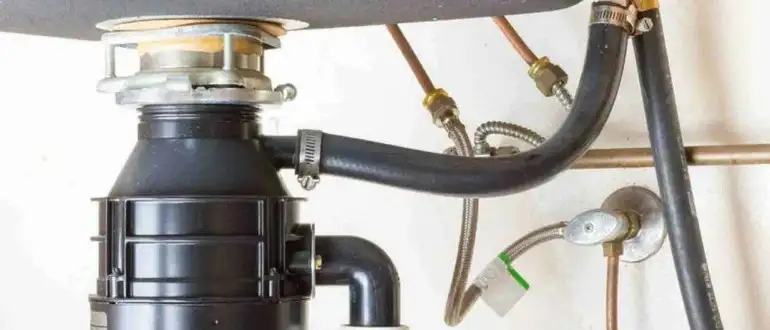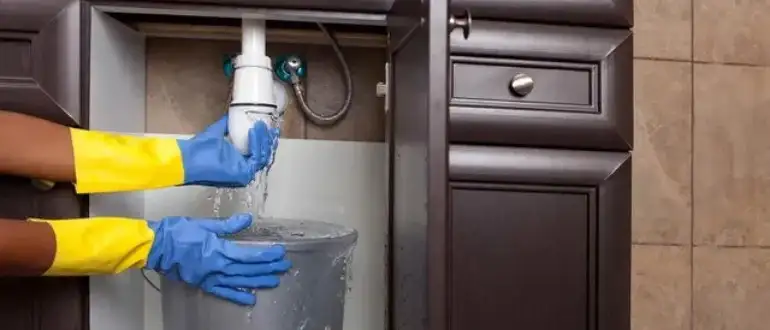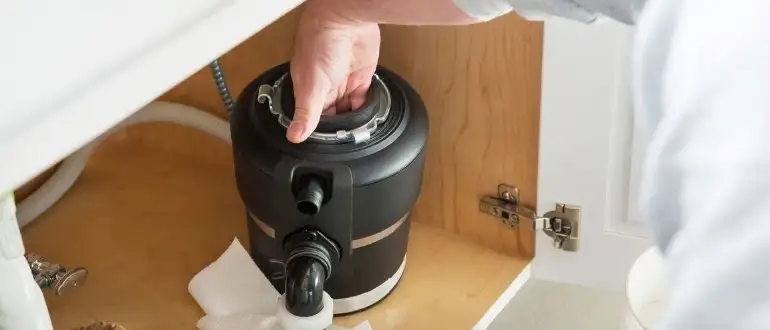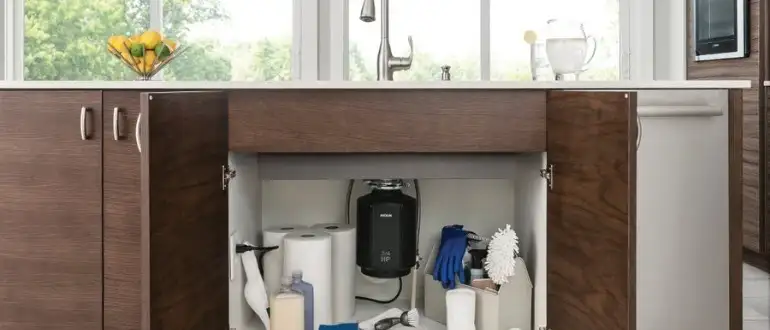If you have a septic tank, you may wonder if it’s safe to have a dishwasher and garbage disposal installed.
While these appliances can make life more convenient, they can also pose a risk to your septic system if not used properly.
In this blog post, we’ll explore whether it’s possible to have a dishwasher and garbage disposal with a septic tank and provide some tips for ensuring they don’t cause any problems.
Can You Have a Dishwasher and Garbage Disposal with a Septic Tank?
Yes, you can have a dishwasher and garbage disposal with a septic tank. However, the septic system must be designed and maintained with both of these appliances in mind in order to ensure it functions properly.

Garbage Disposal
A garbage disposal is a handy appliance that grinds up food waste so that it can be easily flushed down the drain. Here are some benefits of having a garbage disposal:
- It can help reduce the amount of food waste in your kitchen.
- It eliminates the need for a separate compost bin or trash can.
- It’s easy to use and can be an efficient way to dispose of food scraps from your dishwasher.
Despite these benefits, there are some potential downsides to using a garbage disposal, including:
- It can produce unpleasant odors.
- It may not be able to handle all types of food waste.
- It can become clogged or blocked if not used properly.
Septic Tank

A septic tank is a key component of a septic system, which is designed to treat and dispose of wastewater from your home. Here are some advantages of having a septic tank:
- It can provide long-lasting service for up to 25-30 years.
- It can be a cost-effective alternative to a traditional sewer system.
- It can be an efficient way to manage waste from your home.
However, septic tanks also have some potential drawbacks, including:
- They require regular maintenance, including pumping.
- Misuse or improper care can reduce their efficiency.
- They can become less effective over time as sludge accumulates.
Things You Need To Do
If you want to use a dishwasher and garbage disposal with a septic tank, there are some things you need to do to ensure they work properly together.

Here are some tips to follow:
Be careful what you put down the drain
Septic tanks are sensitive and can become clogged or damaged if you put the wrong things down the drain.
Avoid putting non-biodegradable items like coffee grounds, cat litter, and trash down the drain.
Also, limit the amount of solid waste you send to the tank to prevent it from becoming overwhelmed.
Use the garbage disposal strategically
Garbage disposals can be a helpful tool for managing food waste, but they can also cause problems if not used properly.
Here are some things to keep in mind when using a garbage disposal with a septic tank:
- Use cold water when grinding food waste. This can help prevent the food from sticking to the disposal.
- Add a few drops of dish soap to the disposal after washing dishes. Then run the disposal with cold water for about a minute to help clean it.
- Run the disposal regularly to prevent rust and corrosion.
- Avoid putting fibrous or starchy foods like onion skins, corn husks, and potato peels down the disposal. These can clog the motor and cause problems.
- Don’t pour oil, fat, or grease down the drain or disposal. This can clog the system and reduce the disposal’s efficiency.
- Avoid putting glass, plastic, metal, or other non-food items down the disposal.
Maintain the septic tank regularly.
To keep your septic tank in good working order, it’s important to have it pumped regularly.
The frequency of pumping will depend on factors like the size of your tank and the number of people in your household.
Be sure to have your tank inspected regularly to catch any problems early.
How To Troubleshoot Common Issues That May Arise
If you have a dishwasher and garbage disposal connected to a septic tank, it’s important to know how to troubleshoot common issues that may arise.
Here are some tips to help you identify and solve problems with your system:
Clogging in the Drain
If you notice that your sink is draining slowly or not at all, it could be a sign of clogging in the drain.
To resolve this issue, you can try using a plunger to dislodge any blockages. You can also pour hot water down the drain to help clear any buildup.
If these methods don’t work, you may need to call a plumber to assess the situation.
Foul Odors
If your septic system is emitting foul odors, it could be a sign of a problem. One possible cause could be a buildup of food waste in the garbage disposal.
To solve this issue, try cleaning the disposal by grinding up a few slices of lemon or lime, or by pouring baking soda and vinegar down the drain.
You should also make sure to regularly clean and maintain your septic tank.
Slow Draining Dishwasher
If your dishwasher is draining slowly, it could be a sign of a clogged drain hose.
You can try cleaning the hose by disconnecting it from the sink and running hot water through it.
You can also use a pipe cleaner or a wire hanger to remove any blockages. If these methods don’t work, you may need to call a professional to assess the situation.
Grinding Noise
If you hear a grinding noise coming from your garbage disposal, it could be a sign of a mechanical issue.
One possible cause could be a damaged blade or impeller. In this case, you should immediately turn off the disposal and call a professional to assess and repair the damage.
Septic Tank Backup
If your septic tank is backing up into your home, it could be a sign of a serious issue.
You should immediately stop using your dishwasher and garbage disposal and call a professional to assess the situation. Septic backups can be dangerous and require prompt attention.
What is the best garbage disposal for a septic system?

Having a good garbage disposal system is essential for those who have septic systems.
The reason is that it helps to prevent complications that may arise when food waste is not properly disposed of in the septic tank.
Therefore, it is important to choose a reliable and efficient garbage disposal system that can work effectively with a septic system.
One of the best options for a septic system is the InsinkErator Garbage Disposal or the Waste King L-111 garbage disposal. Both models offer excellent grinding power and a high Resolution per minute (RPM) that can effectively reduce food wastage and work well with standard septic systems.
It is important to note that when using a garbage disposal with a septic system, it is necessary to limit the amount of leftover food grinding to get the best performance from your disposal.
This can help to avoid potential issues that may arise with the septic system.
To ensure that your garbage disposal system works efficiently, it is recommended to follow the user manual instructions provided with the unit.
Additionally, it is important to balance the septic tank size to allow extra storage for the wastage of food.
Overall, investing in a reliable garbage disposal system can help to improve the performance and longevity of your septic system.
The InsinkErator Garbage Disposal and the Waste King L-111 garbage disposal are both great options to consider for those who have septic systems.
FAQs
Can You Have A Dishwasher With A Septic Tank?
Yes, you can, as long as you use a dishwasher detergent that is safe for septic systems.
Can You Have A Garbage Disposal With A Septic Tank?
Yes, but it is not recommended as it can increase the load on the septic system and cause problems.
How Often Should You Clean Your Septic Tank If You Have A Dishwasher And Garbage Disposal?
It is recommended to have your septic tank pumped every 3-5 years, but this can vary depending on the size of your tank and usage.
What Kind Of Dishwasher Detergent Should You Use With A Septic Tank?
Look for detergents that are labeled as “Septic Safe” or “Septic System Safe” to avoid damaging your septic system.
How Can You Reduce The Load On Your Septic System If You Have A Dishwasher And Garbage Disposal?
Avoid putting large amounts of food waste down the disposal and consider composting instead.
Also, try to spread out your water usage throughout the day instead of using large amounts of water all at once.
Final Thoughts
It is possible to have a dishwasher and garbage disposal with a septic tank, but it requires proper precautions and maintenance.
To ensure a smooth food scraping system and a long-lasting septic system, it’s important to choose a garbage disposal compatible with a septic system, limit the amount of solid waste, avoid putting non-biodegradable items in the disposal, and follow proper usage and maintenance guidelines.
By doing so, you can enjoy the benefits of garbage disposal without harming your septic system.
References:
1. https://doh.wa.gov/community-and-environment/wastewater-management/septic-system/caring-your-system
2. https://www.epa.gov/sites/default/files/2017-07/documents/septicsmart_week_flyer_082415_508-v2.pdf

